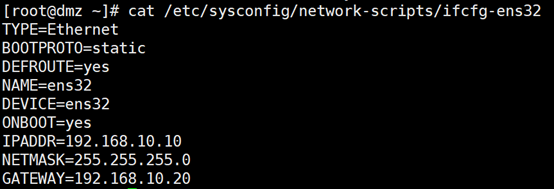firewalld防火墙(一)
本文共 2833 字,大约阅读时间需要 9 分钟。
实验案例:基于区域、服务、端口的访问控制
实验环境 某公司的Web服务器、网关服务器均采用Linux CentOS 7.3操作系统,如图所示。为了加强网络访问的安全性,要求管理员熟悉firewall防火墙规则的编写,以制定有效、可行的主机防护策略。 实验拓扑:
需求描述:
网关服务器ens33网卡分配到trusted(信任)区域,ens34网卡分配到external(外部)区域,ens35网卡分配到dmz(非军事)区域。 网站服务器和网关服务器将ssh默认端口都改为12345 网站服务器开启https,过滤未加密的http流量,且拒绝ping。 实验步骤: Step①基本环境配置 (1)为网关服务器与网站服务器配置主机名及网卡地址 网关服务器: [root@Centos ~]# hostnamectl set-hostname trusted


企业内网测试机:
[root@trusted ~]# hostnamectl set-hostname trusted
Internet测试用机
[root@externsl ~]# hostnamectl set-hostname externsl
网站服务器:
[root@dmz ~]# hostnamectl set-hostname dmz
更改SSH的监听端口
网关改ssh端口 [root@gateway ~]# vim /etc/ssh/sshd_config 网站改ssh端口 [root@dmz ~]# vim /etc/ssh/sshd_config
[root@gateway ~]# systemctl restart sshd //重新启动服务
(2)开启网关服务器的路由转发功能 [root@gateway ~]# vim /etc/sysctl.conf
Step②在网站服务上部署web站点
(1) 安装httpd和mod_ssl软件包 [root@dmz ~]# yum -y install httpd mod_ssl (2) 启用并启动httpd服务 [root@dmz ~]# systemctl start httpd [root@dmz ~]# systemctl enable httpd (3) 创建网站测试页 [root@dmz ~]# echo “this is a test web” >> /var/www/html/index.html Step③为网站服务和网关服务编写firewalld规则 (1) 网站服务规则 1) 开启并启动firewall [root@dmz ~]# systemctl start firewalld [root@dmz ~]# systemctl enable firewalld 2) 将默认区域改为dmz [root@dmz ~]# firewall-cmd --set-default-zone=dmz 查看默认区域 [root@dmz ~]# firewall-cmd --get-default-zone Dmz 3) 为dmz区域打开https服务及添加TCP的12345端口 [root@dmz ~]# firewall-cmd --zone=dmz --add-service=https --permanent [root@dmz ~]# firewall-cmd --zone=dmz --add-port=12345/tcp --permanent (–permanent为设置永久性规则) 4)禁止ping [root@dmz ~]# firewall-cmd --add-icmp-block=echo-request --zone=dmz –permanent 5) 因为预定义的ssh更改了默认端口,所以将预定义ssh服务移除 [root@dmz ~]# firewall-cmd --zone=dmz --remove-service=ssh –permanent 6) 重新加载firewalld激活配置,并查看 [root@dmz ~]# firewall-cmd –reload [root@dmz ~]# firewall-cmd --list-all --zone=dmz
(2)在网关服务器上配置firewalld防火墙
1)启动并启用防火墙 [root@gateway ~]# systemctl start firewalld [root@gateway ~]# systemctl enable firewalld 查看防火墙状态 [root@gateway ~]# firewall-cmd --state running 2)设置默认区域为external区域,并查看配置结果 [root@gateway ~]# firewall-cmd --set-default-zone=external
4) 将ens32网卡配置到trusted区域,将ens35配置到dmz区域
[root@gateway ~]# firewall-cmd --change-interface=ens32 --zone=trusted [root@gateway ~]# firewall-cmd --change-interface=ens35 --zone=dmz 查看配置 [root@gateway ~]# firewall-cmd --get-active-zones
5) 配置external区域添加TCP的12345端口
[root@gateway ~]# firewall-cmd --zone=external --add-port=12345/tcp –permanent 6) 配置external区域移除SSH服务 [root@gateway ~]# firewall-cmd --zone=external --remove-service=ssh --permanent 7)配置external区域禁止ping [root@gateway ~]# firewall-cmd --zone=external --add-icmp-block=echo-request –permanent 8) 重新加载防火墙激活配置 [root@gateway ~]# firewall-cmd –reload验证;
- 在互联网测试计算机上通过SSH登录网关外部接口12345端口 [root@externsl ~]# ssh -p 12345 192.168.200.20

2)在企业内网测试计算机SSH登录web网站服务器的12345端口
[root@trusted ~]# ssh -p 12345 192.168.10.10
3)在企业内网测试机上访问网站服务器

转载地址:http://wbbnz.baihongyu.com/
你可能感兴趣的文章
NIFI分页获取Postgresql数据到Hbase中_实际操作---大数据之Nifi工作笔记0049
查看>>
NIFI同步MySql数据_到SqlServer_错误_驱动程序无法通过使用安全套接字层(SSL)加密与SQL Server_Navicat连接SqlServer---大数据之Nifi工作笔记0047
查看>>
Nifi同步过程中报错create_time字段找不到_实际目标表和源表中没有这个字段---大数据之Nifi工作笔记0066
查看>>
NIFI大数据进阶_FlowFile拓扑_对FlowFile内容和属性的修改删除添加_介绍和描述_以及实际操作---大数据之Nifi工作笔记0023
查看>>
NIFI大数据进阶_FlowFile生成器_GenerateFlowFile处理器_ReplaceText处理器_处理器介绍_处理过程说明---大数据之Nifi工作笔记0019
查看>>
NIFI大数据进阶_Json内容转换为Hive支持的文本格式_操作方法说明_01_EvaluteJsonPath处理器---大数据之Nifi工作笔记0031
查看>>
NIFI大数据进阶_Kafka使用相关说明_实际操作Kafka消费者处理器_来消费kafka数据---大数据之Nifi工作笔记0037
查看>>
NIFI大数据进阶_Kafka使用相关说明_实际操作Kafka生产者---大数据之Nifi工作笔记0036
查看>>
NIFI大数据进阶_NIFI的模板和组的使用-介绍和实际操作_创建组_嵌套组_模板创建下载_导入---大数据之Nifi工作笔记0022
查看>>
NIFI大数据进阶_NIFI监控功能实际操作_Summary查看系统和处理器运行情况_viewDataProvenance查看_---大数据之Nifi工作笔记0026
查看>>
NIFI大数据进阶_NIFI监控的强大功能介绍_处理器面板_进程组面板_summary监控_data_provenance事件源---大数据之Nifi工作笔记0025
查看>>
NIFI大数据进阶_NIFI集群知识点_认识NIFI集群以及集群的组成部分---大数据之Nifi工作笔记0014
查看>>
NIFI大数据进阶_NIFI集群知识点_集群的断开_重连_退役_卸载_总结---大数据之Nifi工作笔记0018
查看>>
NIFI大数据进阶_内嵌ZK模式集群1_搭建过程说明---大数据之Nifi工作笔记0015
查看>>
NIFI大数据进阶_外部ZK模式集群1_实际操作搭建NIFI外部ZK模式集群---大数据之Nifi工作笔记0017
查看>>
NIFI大数据进阶_实时同步MySql的数据到Hive中去_可增量同步_实时监控MySql数据库变化_操作方法说明_01---大数据之Nifi工作笔记0033
查看>>
NIFI大数据进阶_离线同步MySql数据到HDFS_01_实际操作---大数据之Nifi工作笔记0029
查看>>
NIFI大数据进阶_离线同步MySql数据到HDFS_02_实际操作_splitjson处理器_puthdfs处理器_querydatabasetable处理器---大数据之Nifi工作笔记0030
查看>>
NIFI大数据进阶_离线同步MySql数据到HDFS_说明操作步骤---大数据之Nifi工作笔记0028
查看>>
NIFI大数据进阶_连接与关系_设置数据流负载均衡_设置背压_设置展现弯曲_介绍以及实际操作---大数据之Nifi工作笔记0027
查看>>